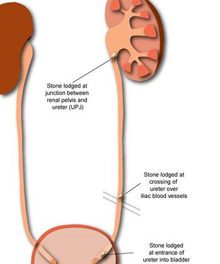 It is startling to realize that 1 in 3 women will be diagnosed with cancer in their lifetime. For those women who have cervical, ovarian or another gynecologic cancer, there is the added burden of having cancer in a part of the body that people are generally uncomfortable discussing.
It is startling to realize that 1 in 3 women will be diagnosed with cancer in their lifetime. For those women who have cervical, ovarian or another gynecologic cancer, there is the added burden of having cancer in a part of the body that people are generally uncomfortable discussing.
Let’s face it, many consider that area “below the belt” to be a taboo subject and the “details” a bit scandalous. This lack of comfort discussing GYN health is part of the reason these cancers are so deadly. But for those women who are diagnosed with a cancer of their reproductive organs, they often learn all too quickly that modesty is less important than once thought, and the “details” could mean the difference between life and death.
I remember all too clearly the moment I found out my mother had primary peritoneal cancer, a form of ovarian cancer. I felt like I was caught in a horrible nightmare and couldn’t wake up. She had battled symptoms for months before being diagnosed and even though we were relieved to finally have an explanation, the diagnosis felt like a death sentence. Less than two months later, at age 33, I was diagnosed with invasive cervical cancer through routine screening. I was initially in disbelief that in a matter of weeks, I would be having surgery to remove most of what I considered uniquely “female” and would trade my life for my chance for more children. I was angry that I had gone for my screenings like I should and had never had an abnormal GYN exam. “How is this possible when I feel fine??!!?” kept echoing in my mind.
The reality is that screening is excellent at detecting cervical cancer but not perfect. I was also too old to have been offered the HPV vaccine, which now prevents the majority of cervical cancer. And on top of the roller coaster of emotions that comes with any cancer diagnosis, I found myself feeling embarrassed and wondering if somehow I had caused the cancer. There is a stigma with cervical cancer because of the association with HPV, even though the majority of adult women will be exposed to HPV in their lifetime. In talking with other cervical cancer survivors, I realized this is a common feeling and unfair emotional baggage. In reality, all women are at risk for a gynecologic cancer, including those who have had a hysterectomy and those who have never been sexually active.
My frustration with the silence and confusion surrounding GYN cancers is part of why I created a non-profit organization called Help the Hoo-Hahs. Our goal is increasing awareness as well as providing support and financial assistance for all gynecologic cancers. It is truly amazing the difference the Susan G. Komen Foundation has made in the last 30 years with breast cancer. Men and women worldwide know what a pink ribbon stands for and aren’t embarrassed to show their support. I hope that our organization can also make a global change in the way society views gynecologic cancers. Maybe 30 years from now when someone sees a teal ribbon or one of our “bikinis”, they remember the importance of GYN health. We all owe our lives to those vital organs of women and hopefully our organization can make a difference in opening the lines of communication for both men and women.
Screening, Testing and Prevention:
Contrary to the “silent killer” label still associated with ovarian cancer, the majority of women do have subtle warning signs. For cervical cancer, the majority of cases are caused by human papillomavirus (HPV). More than 50% of men and women will be exposed to HPV in their lifetime and the types of HPV that cause cancer generally have no outward signs or symptoms. Additionally, HPV is also the cause of most anal and penile cancers so pay attention guys!
The Centers for Disease Control (CDC) agrees that is crucial for parents to have their daughters and sons vaccinated by their teen years, before they have become sexually active. I know some parents are nervous about vaccines and worry this will condone sexual activity. However, HPV can be spread by skin to skin contact and let’s be honest, most everyone is going to have some type of sexual activity at some point in their lifetime. Think about it, we vaccinate our children against measles and mumps but when was the last time you knew someone who had either? This is a remarkable chance to prevent the majority of cervical cancer cases and reduce the risk for other cancers as well.
Finally, it is important for all women to have a yearly visit with their gynecologist and may benefit from HPV DNA testing. Most cervical cases can be caught early, when treatment is most effective and doesn’t require life altering surgery or worse.
Warning Signs of Gynecological Cancer:*
– Persistent abdominal bloating
– Trouble eating or feeling full after only a small amount of food
– Urinary symptoms (urgency or frequency)
– Persistent pelvic or abdominal pain
– Pain during intercourse or unusual vaginal bleeding
*Although these symptoms can also be caused by other conditions, it is important to talk to your gynecologist if these symptoms last for two or more weeks
Raising Support
Last year Help the Hoo-Hahs raised over $10,000 with our 5K fundraiser and hundreds came out to show their support. These funds are being used locally for comfort care items for women undergoing cancer treatment, community education and hereditary ovarian cancer testing. September is National Gynecological Cancer Awareness month and this year Help the Hoo-Hahs hopes to raise $20,000 for local women battling GYN cancers.
How you can help:
2nd Annual Help the Hoo-Hahs 5K Walk/Run
8a.m., Saturday, September 22, 2012
Savannah Trade & Convention Center
Savannah, Georgia
To learn more, register, or make a tax deductible donation in someone’s honor, visit www.helpthehoohahs.org. “Like” our Facebook page and check out the pictures from last year’s event.






